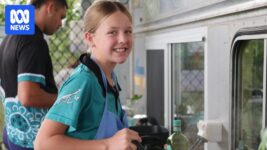
Aldavilla school’s unique ‘railway kitchen garden’ teaching kids benefits of paddock to plate
Inside an old railway carriage, primary school students are cooking up a Mexican-inspired feast with herbs and vegetables freshly picked from their own kitchen garden.
The students, in regional New South Wales, are working together with enthusiasm.
“We get to use all the ingredients from our garden to include in our recipes and we get to experiment with new flavours,” student Layla Morgan said.
The years 5 and 6 students are from the Aldavilla Public School, west of Kempsey, which runs a kitchen garden program with a unique cooking space in a repurposed old Sydney railway carriage.
“Aldavilla Station” was created after the school secured a Stephanie Alexander Kitchen Garden Foundation grant. (ABC Mid North Coast: Emma Siossian)
For the past decade, the Aldavilla Kitchen Garden has taught scores of kids about the benefits of cooking and eating a variety of foods that they have grown themselves.
“They can actually learn where food comes from and how they make it, and that it’s just not bought off the supermarket shelf,” the kitchen garden coordinator Gaye Dufty said.
Ms Dufty has been a driving force behind the program and recently received a NSW Public Education Secretary’s Award for Excellent Service for her role in ensuring its success.
Craig Stelmack and Gaye Dufty in the kitchen garden, outside the train carriage cooking space. (ABC Mid North Coast: Emma Siossian)
“The kitchen garden program brings the community together. The kids absolutely love it … it’s great life skills for them,” she said.
The students enjoy cooking at the “Aldavilla Railway”. (ABC Mid North Coast: Emma Siossian)
Student Gemma Poe said it was a great change from classroom learning.
“We get to cook with the five food groups … and it’s really nice for us to take home something healthy for us to have for dinner,” she said.
Unique railway kitchen
Ms Dufty said the old railway carriage was transported to the school in the late 1990s, after being donated by the State Rail Authority of New South Wales.
Cooking stations have been set up within the old railway carriage. (ABC Mid North Coast: Emma Siossian)
“They had to have a low loader bring it from Sydney … it was basically that [the driver] had stubbed the cigarette out in the ashtray and had left, and [the carriage] was just like that,” Ms Dufty said.
It was originally used as an Aboriginal resource centre at the school.
Its transformation into a cooking and eating space — with a covered outdoor deck — came about after the school secured a Stephanie Alexander Kitchen Garden Foundation Grant in 2011.
Craig Stelmack helps Aldavilla students during a cooking session. (ABC Mid North Coast: Emma Siossian)
Stephanie Alexander is one of Australia’s most recognised chefs and established the Kitchen Garden Foundation in 2004 to promote healthy eating habits and combat childhood obesity.
Families embrace healthy cooking
The program has around 50 regular volunteers including parents and grandparents. (ABC Mid North Coast: Emma Siossian)
Ms Dufty said the program had proven highly popular with students and was also supported by community volunteers who helped the children prepare and cook meals.
So far this year more than 50 volunteers have taken part and Ms Dufty said before the COVID-19 pandemic the number of volunteers was up to 200 a year.
As the cost of living surges, parents and grandparents are also learning more about ways to fall back on home-grown fruit and vegetables.
The students help maintain the kitchen garden. (ABC Mid North Coast: Emma Siossian)
“The students go home and say what they cooked and how they enjoyed it, and it encourages the parents to go and get those ingredients and have a go at making it themselves as well,” Ms Dufty said.
Grandparent, Hugh McNee, regularly took part.
Hugh McNee loves taking part with his granddaughter, Elizabeth. (ABC Mid North Coast: Emma Siossian)
“It’s just a bit of guidance, but they know what they are doing, and it’s just good to interact with them,” Mr McNee said.
International chef’s ‘dream job’
Craig Stelmack has worked in high-profile restaurants and says he’s now walked into his “dream job”. (ABC Mid North Coast: Emma Siossian)
Ms Dufty is now preparing to retire and is training her replacement – Canadian-born professional chef Craig Stelmack.
He has worked in high-profile international restaurants including at Queensland’s Lizard Island Resort, and was most recently based in Victoria’s Gippsland.
“I’ve basically walked into my dream job,” Mr Stelmack said.
“I love cooking, I love gardening, I have always had vegetable gardens and gardens in the kitchens I have worked in commercially, so I am over the moon.
“I did my apprenticeship under chef Michael Smith [high-profile Canadian chef], he has his own cooking shows, that sort of thing … so I’ve had my share of working in some high-profile kitchens.”
Each cooking session also includes setting the table and sitting down to dine together. (ABC Mid North Coast: Emma Siossian)
Mr Stelmack said the students had already impressed him with their skills and aptitude.
“The kids are amazing, honestly the level they operate at, a lot of the time it’s what I expect from my first-year apprentices,” he said.
“They are asking questions, they are engaged with what they are doing.
“Food has a season … things can be hard to grow, and it makes them appreciate food a bit more.”



